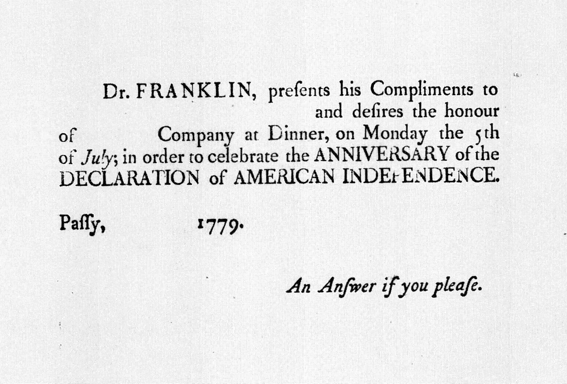Invitation to an Independence Day Celebration, [before 24 June 1779]
Invitation to an Independence Day Celebration
D: American Philosophical Society
Franklin’s celebrated press at Passy has left surprisingly few traces beyond the now-rare imprints which were its products, and even those are sometimes impossible to date. No one knows precisely when the press was established, or from whence Franklin procured the initial printing equipment. We do know that he had met Jean-François Fournier fils in the summer of 1777, and ordered from him fifty pounds of type. Fournier tried to convince the American that he needed a full font, at least fourteen times that amount. Franklin settled on a modest 261 pounds of gros romain or 18-point great primer, roman and italic, which was delivered in October, 1778.7 Why we have no evidence of any printing activity before mid–1779 remains a mystery. This particular blank invitation form for a dinner celebrating the anniversary of American Independence, printed in Fournier’s gros romain, is the sole surviving example of the earliest Passy imprint that can be dated with any certainty.8
The occasion for which Franklin seems to have inaugurated his press was a special one; it was his own formal introduction to the American community as sole minister plenipotentiary. A year earlier, he and John Adams had hosted a similar dinner in Passy on the fourth of July, to which they invited all the Americans in the vicinity of Paris, and a few local French “Gentlemen.” The animosity which Franklin felt toward certain of those Americans, especially Ralph Izard, had reached such a pitch that he refused to invite them; they would not have attended had Adams not insisted upon issuing invitations in his name alone.9 A year later, exuberant in his post, Franklin printed his own invitations, setting his name in capital letters, and sent them to those very Americans remaining in Paris who had worked so hard for his recall. Although none of the issued invitations has survived, a partial guest list can be compiled from the replies now among Franklin’s papers, the first of which is dated June 24.1 The celebration itself, delayed by one day since July 4 fell on a Sunday, will be discussed in volume 30.
[before June 24, 1779]2
Dr. FRANKLIN, presents his Compliments to
and desires the honour
of Company at Dinner, on Monday the 5th of July; in order to celebrate the ANNIVERSARY of the DECLARATION of AMERICAN INDEPENDENCE.
Passy, 1779.
An Answer if you please.

7. See XXIV, 500–1, and XXVII, 618.
8. Luther S. Livingston, Franklin and his Press at Passy (New York, 1914), pp. 78–9.
9. See Butterfield, John Adams Diary, IV, 143–4. Among the group BF would have omitted JA named only Izard and Dr. Smith (James Smith, for whom see XXVI, 387n, and subsequent volumes), but he implied that there were others. He also listed some of the French invités: Messrs. Chaumont, Brillon, Le Veillard, Grand, Beaudoin (presumably Sartine’s secretary Baudoin), Gérard de Rayneval, and the abbés Chalut and Arnoux. He went on to note the general disapproval with which the court ministers regarded BF’s circle of friends.
1. In chronological order, they are from Edmund Jenings, Ralph and Alice Izard, Arthur Lee, Samuel Petrie, the abbés Chalut and Arnoux, Samuel Wharton (who will bring his son Joseph), Montfort de Prat, Ferdinand Grand, Barbeu-Dubourg, and on July 7, having only just returned to town and found his invitation, Laneuville.
2. The date of the first extant reply.

![University of Virginia Press [link will open in a new window] University of Virginia Press](/lib/media/rotunda-white-on-blue.png)
